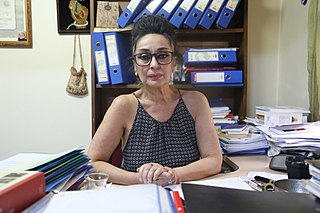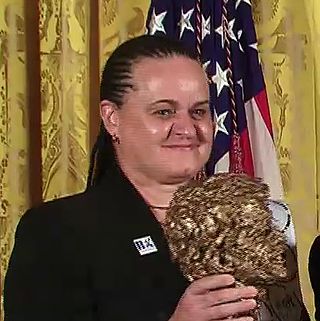This article needs to be updated.(November 2010) |
Arnold Tsunga was the Director of the Africa Regional Programme of the International Commission of Jurists (ICJ) until 2020.
This article needs to be updated.(November 2010) |
Arnold Tsunga was the Director of the Africa Regional Programme of the International Commission of Jurists (ICJ) until 2020.
Before joining the ICJ, he was the Executive Director of Zimbabwe Lawyers for Human Rights (ZLHR) as well as the acting Executive Secretary of the Law Society of Zimbabwe (LSZ) and the National Chairperson of Zimbabwe Human Rights Association (ZimRights). He served as a Humphrey Fellow at the Hubert H. Humphrey Institute of Public Affairs at the University of Minnesota.
The Zimbabwe Lawyers for Human Rights is a human rights organization that provides legal representation to victims of human rights abuses and also defends human rights defenders who are arrested and detained in Zimbabwe. Tsunga has helped document human rights abuses in Zimbabwe and brought them to the attention of the international community. The ZLHR now plays a major role in defending against sustained attacks on the rule of law and human rights in Zimbabwe and in the struggle against impunity in the Southern African region.
He is a trustee of Voice of the People (VOP), a communications trust was established in the year 2000 as an alternative voice for Zimbabweans and advocates for the opening up of the airwaves in Zimbabwe. He faced criminal charges of broadcasting on the radio without a license and went on trial on September 25, 2006, in Zimbabwe. The judge dismissed the case after the government sought a continuance. The case is widely viewed as the many that the regime in Zimbabwe uses to intimidate human rights lawyers from doing their work.
In 2006, he was awarded the Martin Ennals Award for Human Rights Defenders and he was honored as a Human Rights Defender in 2006 by Human Rights Watch among many other awards. In 2004, he was a finalist for the US-based Civil Courage Prize, which "honors civil courage — steadfast resistance to evil at great personal risk — rather than military valor". [1] He ultimately won a "Certificate of Distinction in Civil Courage" and a $1,000 cash prize. [2] In 2013, Tsunga was elected as a member of the Zimbabwean Parliament.
Martin Ennals was a British human rights activist. Ennals served as the secretary-general of Amnesty International from 1968 to 1980. He went on to help found the British human rights organisation ARTICLE 19 in 1987 and International Alert in 1985.
Nguyễn Đan Quế is a Vietnamese endocrinologist and pro-democracy activist in Saigon. He was imprisoned from 1978 to 1988, 1990 to 1998, 2003 to 2005, and briefly in 2011 on state security charges related to his activism. In 2003, The New York Times described him as "Vietnam's most renowned dissident".

The International Commission of Jurists (ICJ) is an international human rights non-governmental organization. It is a standing group of 60 eminent jurists—including senior judges, attorneys and academics—who work to develop national and international human rights standards through the law. Commissioners are known for their experience, knowledge and fundamental commitment to human rights. The composition of the Commission aims to reflect the geographical diversity of the world and its many legal systems.

Akbar Ganji is an Iranian journalist, writer and a former member of Islamic Revolutionary Guard Corps. He has been described as "Iran's preeminent political dissident", and a "wildly popular pro-democracy journalist" who has crossed press censorship "red lines" regularly. A supporter of the Islamic revolution as a youth, he became disenchanted in the mid-1990s and served time in Tehran's Evin Prison from 2001 to 2006, after publishing a series of stories on the murder of dissident authors known as the Chain Murders of Iran. While in prison, he issued a manifesto which established him as the first "prominent dissident, believing Muslim and former revolutionary" to call for a replacement of Iran's theocratic system with "a democracy". He has been described as "Iran's best-known political prisoner".

Nataša Kandić is a Serbian human rights activist and coordinator of the RECOM Reconciliation Network, founder and ex-executive director of the Humanitarian Law Center (HLC), an organization campaigning for human rights and reconciliation in the former Yugoslavia, focusing on the Serbian role in the conflict. It was formed in 1992. The HLC's research was integral to the war crimes prosecutions of the International Criminal Tribunal for the Former Yugoslavia (ICTY), particularly the "smoking gun" video linking Serbian military forces to the Srebrenica massacres. She has won numerous international awards for her human rights work. She is a figure of controversy in Serbia where she was the subject of a defamation lawsuit by former President of Serbia Tomislav Nikolić.
Rafael Marques de Morais is an Angolan journalist and anti-corruption activist who received several international awards for his reporting on conflict diamonds and government corruption in Angola. He currently heads the anti-corruption watchdog Maka Angola.
A human rights defender or human rights activist is a person who, individually or with others, acts to promote or protect human rights. They can be journalists, environmentalists, whistleblowers, trade unionists, lawyers, teachers, housing campaigners, participants in direct action, or just individuals acting alone. They can defend rights as part of their jobs or in a voluntary capacity. As a result of their activities, human rights defenders (HRDs) are often subjected to reprisals including smears, surveillance, harassment, false charges, arbitrary detention, restrictions on the right to freedom of association, physical attack, and even murder. In 2020, at least 331 HRDs were murdered in 25 countries. The international community and some national governments have attempted to respond to this violence through various protections, but violence against HRDs continues to rise. Women human rights defenders and environmental human rights defenders face greater repression and risks than human rights defenders working on other issues.

Navanethem "Navi" Pillay is a South African jurist who served as the United Nations High Commissioner for Human Rights from 2008 to 2014. A South African of Indian Tamil origin, Pillay was the first non-white woman judge of the High Court of South Africa. She has also served as a judge of the International Criminal Court and President of the International Criminal Tribunal for Rwanda. Her four-year term as High Commissioner for Human Rights began on 1 September 2008 and was extended an additional two years in 2012. In September 2014 Prince Zeid bin Ra'ad succeeded her in her position as High Commissioner for Human Rights. In April 2015, Pillay became the 16th Commissioner of the International Commission Against the Death Penalty. She is also one of the 25 leading figures on the Information and Democracy Commission launched by Reporters Without Borders.
Michael Richard Ratnarajan Hoole is a Sri Lankan Tamil mathematician, academic and human rights activist. He was one of the founders of University Teachers for Human Rights (UTHR) which documented human rights abuses during the Sri Lankan Civil War.
The Martin Ennals Award for Human Rights Defenders, sometimes called "the Nobel Prize for human rights", is an annual prize for human rights defenders. It was created in 1993 to honour and protect individuals around the world who demonstrate exceptional courage in defending and promoting human rights. Its principal aim is to provide protection to human rights defenders who are at risk by focusing international media attention on their plight, mainly through online means and advocacy work. The Award is named after British human rights activist Martin Ennals, former secretary general of Amnesty International and a Nobel Peace Prize laureate.

Emadeddin Baghi is an Iranian Journalist, human rights activist, prisoners' rights advocate, investigative journalist, theologian and writer. He is the founder and head of the Committee for the Defense of Prisoners' Rights and the Society of Right to Life Guardians in Iran, and the author of twenty books, six of which have been banned in Iran. Baghi was imprisoned in connection with his writings on the Chain Murders of Iran, which occurred in Autumn 1998, and imprisoned again in late 2007 for another year on charges of "acting against national security." According to his family and lawyers, Baghi has been summoned to court 23 times since his release in 2003. He has also had his passport confiscated, his newspaper closed, and suspended prison sentences passed against his wife and daughter. Baghi was rearrested on 28 December 2009 on charges related to an interview with Grand Ayatollah Hussein-Ali Montazeri. Baghi was released and then again rearrested on 5 December 2010.
Zimbabwe Lawyers for Human Rights (ZLHR) is a not for profit human rights organization whose core objective is to foster a culture of human rights in Zimbabwe as well as encourage the growth and strengthening of human rights at all levels of Zimbabwean society through observance of the rule of law.

Eren Keskin is a Kurdish lawyer and human rights activist in Turkey. She is the vice-president of the Turkish Human Rights Association (İHD) and a former president of its Istanbul branch. She co-founded the project "Legal Aid For Women Who Were Raped Or Otherwise Sexually Abused by National Security Forces”, to expose abuses happening to women in Turkish prisons. She has been arrested, imprisoned, and the object of numerous lawsuits in relation to her human rights activities.

Angkhana Neelaphaijit, née Angkhana Wongrachen, is a Thai human rights activist, former member of the National Human Rights Commission, and the wife of disappeared human rights lawyer Somchai Neelaphaijit. Amnesty International described her as "a leading human rights defender in Southern Thailand".

Jenni Williams is a Zimbabwean human rights activist and a founder of Women of Zimbabwe Arise (WOZA). A prominent critic of President Robert Mugabe's government, she was described by The Guardian in 2009 as "one of the most troublesome thorns in Mugabe's side".

Kasha Jacqueline Nabagesera is a Ugandan LGBT rights activist and the founder and executive director of the LGBT rights organization Freedom & Roam Uganda (FARUG). She received the Martin Ennals Award for Human Rights Defenders in 2011 and the Right Livelihood Award in 2015.

Pierre Claver Mbonimpa is a Burundian human rights activist. He established the Association for the Protection of Human Rights and Incarcerated Persons (APRODH) in August 2001.
The Kenyan Section of the International Commission of Jurists, also known as ICJ Kenya, is a Kenyan non-governmental organisation, a National Section of the International Commission of Jurists. It is composed of lawyers and works to promote human rights and the rule of law.
Huda El-Sarari or Hoda El-Sarari; Hoda Al Sarari is a human rights lawyer from Yemen who was awarded the Martin Ennals Award. She exposed that foreign governments were operating prisons in Yemen. 260 people were released from unlawful imprisonment.
Yu Wensheng is a Chinese human rights lawyer based in Beijing. He is known for criticizing the Chinese Communist Party and taking up politically sensitive cases against the government.
This section's use of external links may not follow Wikipedia's policies or guidelines.(May 2022) |